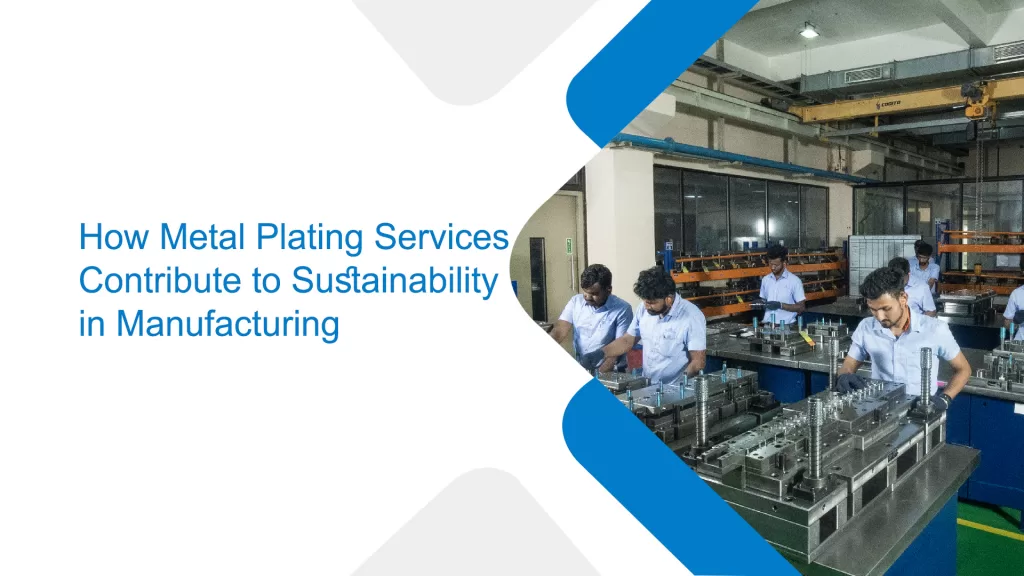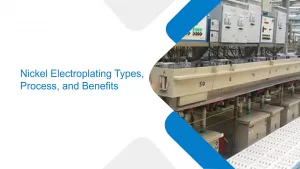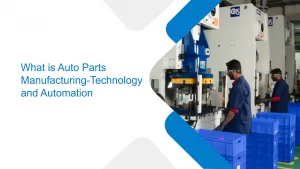How Metal Plating Services Contribute to Sustainability in Manufacturing
- Plating |
- Oct 16, 2024

Balanced economies and smooth trade depend on sustainable design and manufacturing. Manufacturers can make better operational decisions if they know the advantages of sustainable metal manufacturing. They can also help create a more sustainable metal plating and viable future. Here mentioned are the ways metal plating services contribute to sustainability in manufacturing:
Minimizing Waste and Optimizing Resources:
The efficient use of resources is one of the main ways metal plating services promote sustainability. Large volumes of raw materials are frequently needed for traditional manufacturing processes, which depletes resources and produces waste.
However, by using just a thin layer of metal to obtain the desired qualities, metal plating enables resource conservation. The use of metals, many of which have limited supply and are expensive to extract, is reduced by this method.
Furthermore, greater deposition rates and improved control over plated layer thickness have made contemporary plating procedures more effective and reduce wasteful material usage.
Eco-friendly Manufacturing and Design:
Sustainable metal plating techniques provide the foundation of Industry, an interconnected network of production systems that perceive, anticipate, and respond instantly to support output. These innovative manufacturing techniques give businesses a competitive edge using renewable resources, ecologically friendly procedures, and effective sheet metal production.
Conventional production methods may be labor-intensive and wasteful. On the other hand, advances in manufacturing and metal tooling technologies lend support to a more sustainable approach.
Longer Product Life:
Metal plating sustainability considerably lengthens their useful life by shielding items from elements like wear, corrosion, and chemical exposure. Because of its endurance, fewer replacements and repairs will be needed as often, which will lessen the energy and raw material usage involved in producing new goods.
Resource Efficiency:
Manufacturers can obtain the required qualities without utilizing a significant amount of costly or rare resources by applying a thin metal layer. Because of this economical use of resources, there is less need for raw material extraction and processing, negatively influencing the environment.
Energy Efficiency:
Energy efficiency in production can also be improved via metal plating techniques. Creating materials from scratch, such as high-performance alloys or stainless steel, involves significant energy inputs. Metal plating sustainability manufacturers can attain similar performance attributes without using energy-intensive production methods by coating a base material with a protective or useful metal.
Conservation of Resources:
Conservation of resources is one of the major ways industrial metal plating services support sustainability. To produce a product with the appropriate qualities, traditional manufacturing methods frequently need a lot of raw resources.
Using metal plating, producers can get the required properties, such as conductivity, hardness, and corrosion resistance, using less costly or rare elements.
Reduced Waste:
Sustainable metal plating services play a major role in waste reduction, another crucial component of manufacturing sustainability. Conventional production techniques frequently result in significant waste, including surplus material and byproducts.
On the other hand, metal plating is a more exacting procedure that can drastically cut waste. Metal plating can prolong their useful lives by giving components increased resilience and resistance to wear and corrosion.
Product Duration:
Beyond the production process itself, metal plating companies have advantages for sustainability in the final products. Longer product lifespans are a crucial aspect of sustainable manufacturing, and metal plating services help to achieve this goal by improving products’ performance and durability.
Long-lasting products require less energy and raw materials to replace, which lowers the demand for these resources throughout production. Over time, less waste and reduced resource use result from this longer lifespan, decreasing the frequency of replacements.
Adherence to Environmental Regulations:
Metal plating sustainability manufacturers must determine how to comply with environmental requirements while operating profitably and efficiently as these regulations get stricter. Metal plating services offer a feasible substitute since they may be tailored to meet specific regulatory requirements and reduce the environmental impact of production operations.
Measures to prevent and manage emissions, such as the release of heavy metals and volatile organic compounds (VOCs), are frequently included in metal plating services. Plating operations can lessen their environmental effect and adhere to air and water quality laws by implementing sophisticated filtration and waste treatment systems.
Also Read: Metal Plating Exploring Various Types And Techniques
Creation of Closed-Loop Systems and Sustainable Substitute Materials:
Considerable change is being implemented in the metal plating services in response to the growing concerns about sustainability. Developing sustainable material substitutes and putting closed-loop systems in place is crucial for minimizing environmental effects and promoting recyclable material modifications.
Conventional methods of finishing metal frequently entail using substances and materials that may harm human health and the environment.
Partial words:
Eigen can provide you with excellent results since it has the newest equipment, a state-of-the-art manufacturing facility, and a highly skilled team of precision metal stamping specialists on staff. Combining stamping, folding, drawing, and piercing is known as precision metal stamping. Depending on the stamped items, there can be a single operation or a sequence of several operations.
Ujjwal handles crucial roles like AGM Marketing, researcher, and is an author for KDDL – Eigen. He currently works with Eigen for implementing proven techniques and strategies for marketing plans on online and offline platforms. An expert in efficiently executing SEO, SEM, email marketing, social media marketing, PR marketing, Print campaigns, etc. Ujjwal has coordinated an efficient marketing team on various creative campaigns and programmatic buying to support various digital cross-promotion efforts. Implement efficient search optimization strategies with the help of collateral material and metrics.
In his former years, Ujjwal has years of experience in a managerial role for several reputed companies. His years of experience combined with the flair of writing help him come up with result oriented strategies for Eigen.




